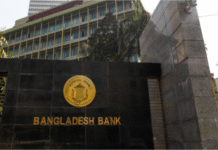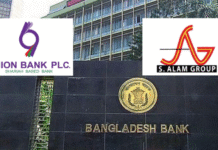

Bangladesh’s economy is projected to grow 6.9 per cent in fiscal year 2022-23 thanks to strong export growth and a rebound in domestic demand, the World Bank (WB) said in its Global Economic Prospects released yesterday.
“In Bangladesh, strong export growth, supported by returning readymade garment demand from abroad, and a rebound in domestic demand—with improving labor income and remittance inflows—supported the recovery,” said the WB.
The multilateral lender forecasted that gross domestic product (GDP) would expand 6.4 per cent in the current fiscal year of 2021-22, up 1.3 percentage points from its June projection of 5.1 per cent for the fiscal.
For the next fiscal year 2022-23, it raised forecast for Bangladesh by 0.7 percentage points from 6.2 per cent.
“Both Bangladesh and Pakistan saw their goods trade deficit widen to record levels on strong domestic demand and rising energy prices,” said the WB, adding that private consumption, the main engine of growth, supported by rising services activity and firming exports of readymade garments improved the outlook for Bangladesh.
It said output in South Asia is projected to expand by 7.6 per cent in 2022, accelerating from 7 per cent the previous year, as Covid-19 vaccination progresses and contact-intensive sectors recover.
“Growth projections have been revised up since June 2021 for each year of the forecast period, largely reflecting better prospects in Bangladesh, India and Pakistan. Returning demand is expected to drive a strong rebound in imports and gradually widen the region’s current account deficit
Growth prospects have improved in the region since June 2021, reflecting forecast upgrades for Bangladesh, India and Pakistan.
Output losses compared to pre-pandemic trends remain significant in the region. Fiscal policy will support growth, but unwind, over the forecast horizon.
Per capita income growth continues to catch up to advanced-economy levels, but at about half the pace prior to the pandemic.
The WB, however, said following a strong rebound in 2021, the global economy is entering a pronounced slowdown amid fresh threats from Covid-19 variants and a rise in inflation, debt, and income inequality that could endanger the recovery in emerging and developing economies.
“The rapid spread of the Omicron variant indicates that the pandemic will likely continue to disrupt economic activity in the near term. In addition, a notable deceleration in major economies—including the United States and China—will weigh on external demand in emerging and developing economies,” said the WB in a statement.
It said at a time when governments in many developing economies lack the policy space to support activity if needed, new Covid-19 outbreaks, persistent supply-chain bottlenecks and inflationary pressures, and elevated financial vulnerabilities in large swaths of the world could increase the risk of a hard landing.
“The world economy is simultaneously facing Covid-19, inflation, and policy uncertainty, with government spending and monetary policies in uncharted territory. Rising inequality and security challenges are particularly harmful for developing countries,” said World Bank Group President David Malpass.
“Putting more countries on a favorable growth path requires concerted international action and a comprehensive set of national policy responses.”









